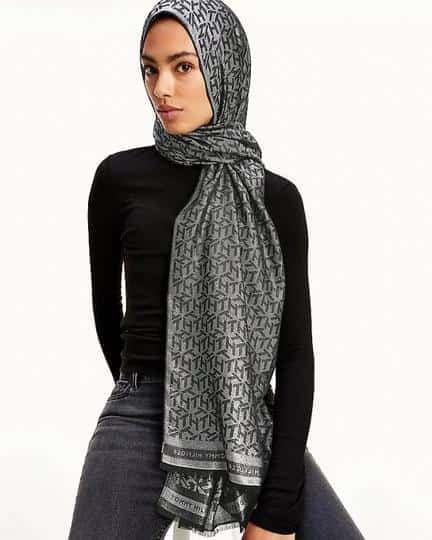Tommy Hilfiger, the top American fashion label, has debuted its first hijab, in a step that some see as a pleasant switch towards appreciating more diversity but others see it as a cunning decision to tap into a growing fashion market segment.
The Hilfiger hijab has initialled the letters “TH” across the garment, and was made from fine jacquard fabric. It comes in ivory and grey. The brand dressed model Halima Aden last month in a custom burkini for the magazine Sports Illustrated.
It’s not the first time that the fashion industry recognises the importance of so-called modest fashion. Anniesa Hasibuan was the first designer to display a collection in 2016 at New York fashion week where all the models wore the hijab. Dolce & Gabbana, DKNY and Mango have done “Ramadan collections,” while Modest Fashion Weeks are happening all over the world.
After criticising the fashion industry for its lack of diversity and racism in the wake of the Black Lives Matter protests, Hilfiger hijab might suggest that major fashion brands are moving forward with practises that favour inclusively and diversity. But the founder of modest fashion brand PFH, Hassanah El-Yacoubi, says it also shows market changes rather than cultural ones.
“It’s more indicative of an ever growing Muslim consumer culture that is lucrative and thriving more than ever now,” El-Yacoubi said.
According to Grand View Research, the Islamic fashion industry is expected to be worth $88 billion by 2025. “I think timing reflects the need to address the growing desire on the market of consumers – especially millennials and Generation Z – to be more inclusive of the brands they support,” said Arthur Zaczkiewicz, executive editor of the fashion industry publication Women’s Wear Daily.
Research has shown that younger consumer groups are much less worried about “fitting in” and more concerned with attempting to make choices that reflect their own moral principles.
After years of being “othered” by mainstream fashion, the view of modest fashion is changing. “I believe that we are going through a permanent cultural shift instead of a fleeting style that is temporarily in vogue,” said El-Yacoubi.
“More and more retailers are focusing on inclusiveness and adding products to their range that support modest dressing,” said Krista Corrigan of Retail Market Intelligence Edited. She said that 10 percent of the stores were tracked by the company’s stock of such clothing, compared to just 2 percent in 2019.
Zaczkiewicz said, “It’s important to understand that modest fashion is not a trend. It’s the way people live. Yet most observers believe that the Hilfiger hijab is only a tiny step towards a broader acceptance of Muslim dress code. “No matter how mainstream or celebrated modest fashion has become, the reality remains that Islamophobia and anti-Muslim sentiments have been at an all-time high in the US,” El-Yacoubi said. Hate-crime violence hit a 16-year high in the US last year, with 52 per cent of UK hate crimes in 2019 having been committed against Muslims.
“Since modest fashion is generally perceived as a phenomenon championed by hijab-wearing women, they usually bear the brunt of such beliefs,” said El-Yacoubi.
Muslim attire continues to be aesitive political issue and source of social stigma of Islamophobia rhetoric.
In July, the German state of Baden-Württemberg forbade burqas andшs in educational institutions. Similar restrictions have been implemented in Sri Lanka and Denmark. Other countries that have prohibited Muslim clothing include Latvia, Austria, Bulgaria and Belgium. Last year, the French sports goods label Decathlon cancelled their plans to sell a sports hijab after politicians’ reactions exposed religious tensions there, again focusing on Islamic dress.
Still, the release of the hijab maintains Hilfiger’s promise to be more progressive and diverse. Last month, its parent organization PVH confirmed a campaign to build opportunities for people of colour in the corporation.
SOURCE: The Guardian

